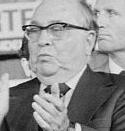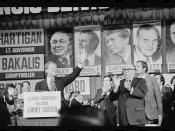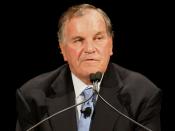The Rise an Fall of the Machine Chicago politics had become synonymous with organized crime. Following the years of prohibition, this reputation had become well earned in that control of many municipal functions was influenced in some way by the underground operations. In a city that initially developed by entrepreneurial ambition, it was no surprise that now money was the core influence in policy decisions. By itself, the criminal element had enough of a deterring effect on the city and its image. But when combined with the structure of the city's administration and the distribution of power, a tool which had originally been created for the good of society just did not work the way it should have.
The "Chicago Machine" had its foundations laid during the brief term (1931-33) of Anton Cermak. The only foreign-born mayor of Chicago to date, he managed to climb the ranks of the Democratic Party, along with Pat Nash, through a quick and skillful mastery of the politics of Chicago's ethnic ghettos.
He opposed the Prohibition that was unpopular with immigrant workers, and carefully balanced Democratic slates and platforms among the many ethnic, labor, and business interests. He believed, like Mayor Richard J. Daley after him, that "good government was good politics-and good politics was good government. Once in office, he tried to run the city and the party like a business: competence was rewarded, but if you did not deliver, then you were out.
Following Cermak's assassination, it was assumed that Pat Nash would assume the mayoral position, yet he waived it due to his aging and a lack of interest. When Ed Kelly filled the spot, the machine was further developed in the ways that it had been previously fabricated. Now dubbed "the Kelly-Nash Machine," the influence of the mayor's office grew...


